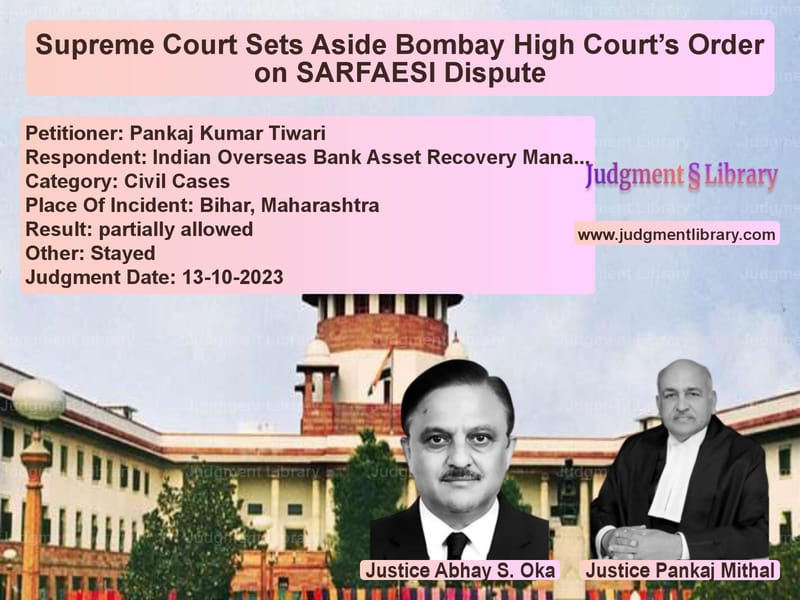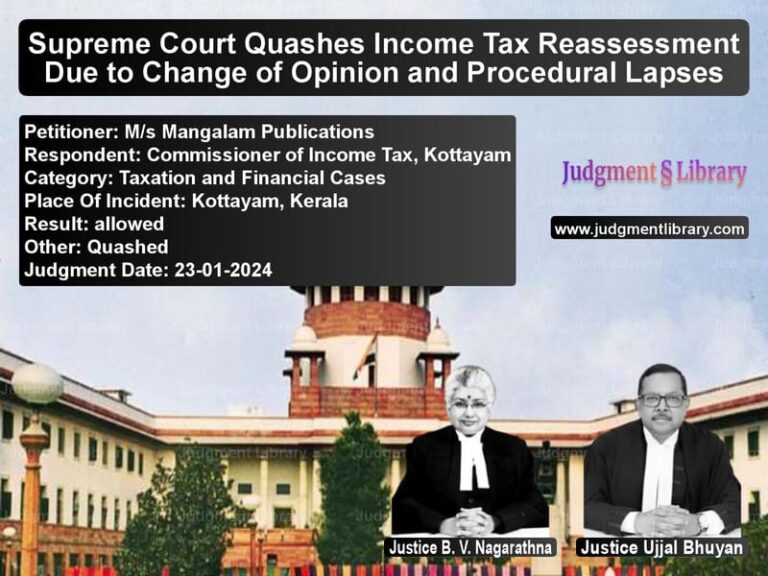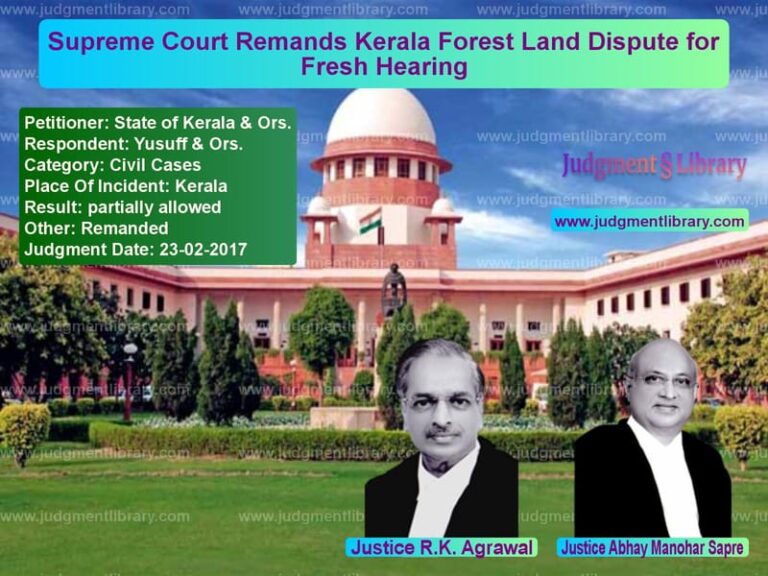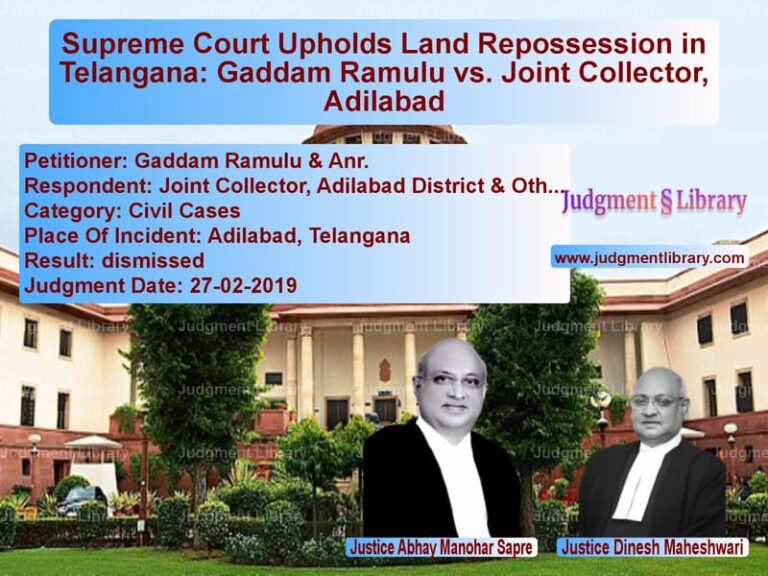Supreme Court Sets Aside Bombay High Court’s Order on SARFAESI Dispute
The Supreme Court of India recently ruled in Pankaj Kumar Tiwari vs. Indian Overseas Bank Asset Recovery Management Branch & Others, addressing crucial issues related to the SARFAESI Act, 2002. The case revolves around a dispute concerning the enforcement of security interests, judicial overreach, and the propriety of High Court interventions in civil suits filed in other states.
Background of the Case
The dispute arose when the Indian Overseas Bank (IOB) proceeded against properties mortgaged under the Securitization and Reconstruction of Financial Assets and Enforcement of Security Interest Act, 2002 (SARFAESI Act). The bank took action against five properties in Maharashtra under Section 14 of the SARFAESI Act, obtaining orders to take possession.
Meanwhile, the appellant, Pankaj Kumar Tiwari, filed a civil suit in a Siwan Civil Court in Bihar, asserting rights over the properties through a Memorandum of Understanding (MoU) dated October 4, 2015. In the suit, Tiwari sought:
- A declaration of his rights over the mortgaged properties.
- Enforcement of the MoU.
- Appointment of a Court Receiver to take possession.
On January 24, 2023, the Siwan Civil Court appointed a Court Receiver—a practicing advocate—who took possession of the properties.
Bombay High Court’s Order
Instead of appealing the Civil Court’s order in Bihar, the bank approached the Bombay High Court under Article 226 of the Constitution, challenging the appointment of the Receiver.
The Bombay High Court stayed the Siwan Civil Court’s order, effectively halting the appellant’s case.
Supreme Court’s Key Observations
The Supreme Court analyzed the case from multiple angles, focusing on jurisdictional overreach and procedural lapses.
1. High Court Should Not Have Intervened
The Supreme Court ruled that the Bombay High Court erred in entertaining the writ petition:
“The High Court ought not to have entertained a writ petition challenging an order passed by a Civil Court in another state when an alternative statutory remedy was available.”
2. Failure to Challenge the Order in Bihar
The Court criticized the bank for bypassing proper legal channels:
“The Indian Overseas Bank had a statutory right to appeal against the Civil Court’s order in Bihar. Instead, it resorted to writ jurisdiction in another state, which was improper.”
3. Suppression of Facts by the Appellant
The Court also found that Tiwari withheld material information while obtaining the order from the Siwan Civil Court:
“The appellant failed to inform the Civil Court that orders under Section 14 of the SARFAESI Act had already been passed, granting possession of the properties to the bank.”
4. Territorial Jurisdiction and Judicial Propriety
The Supreme Court emphasized that the SARFAESI Act provides a structured mechanism for debt recovery, and interference through civil suits in other jurisdictions can lead to judicial chaos.
Final Judgment
The Supreme Court:
- Set aside the Bombay High Court’s order dated September 27, 2023.
- Stayed the Siwan Civil Court’s order appointing a Receiver.
- Directed that the status quo prior to January 24, 2023, should be maintained.
- Allowed the bank to proceed under the SARFAESI Act for recovering possession of remaining properties.
Implications of the Judgment
This ruling sets significant precedents in the field of debt recovery and judicial discipline:
- Restricts High Court Interference: The decision clarifies that High Courts should refrain from interfering in civil suits filed in other states, especially when alternative remedies exist.
- Strengthens SARFAESI Act Enforcement: The judgment reinforces that borrowers cannot circumvent SARFAESI proceedings by filing civil suits in different jurisdictions.
- Emphasizes Full Disclosure in Court: Petitioners must disclose all material facts while seeking judicial relief.
Conclusion
The Supreme Court’s ruling in Pankaj Kumar Tiwari vs. Indian Overseas Bank is a landmark decision ensuring judicial propriety and reinforcing the supremacy of the SARFAESI Act. By restricting High Court interventions and affirming statutory remedies, the judgment ensures a structured approach to debt recovery while preventing legal misuse by borrowers seeking to stall proceedings.
Petitioner Name: Pankaj Kumar Tiwari.Respondent Name: Indian Overseas Bank Asset Recovery Management Branch & Others.Judgment By: Justice Abhay S. Oka, Justice Pankaj Mithal.Place Of Incident: Bihar, Maharashtra.Judgment Date: 13-10-2023.
Don’t miss out on the full details! Download the complete judgment in PDF format below and gain valuable insights instantly!
Download Judgment: pankaj-kumar-tiwari-vs-indian-overseas-bank-supreme-court-of-india-judgment-dated-13-10-2023.pdf
Directly Download Judgment: Directly download this Judgment
See all petitions in Property Disputes
See all petitions in Debt Recovery
See all petitions in Contract Disputes
See all petitions in Judgment by Abhay S. Oka
See all petitions in Judgment by Pankaj Mithal
See all petitions in partially allowed
See all petitions in Stayed
See all petitions in supreme court of India judgments October 2023
See all petitions in 2023 judgments
See all posts in Civil Cases Category
See all allowed petitions in Civil Cases Category
See all Dismissed petitions in Civil Cases Category
See all partially allowed petitions in Civil Cases Category







